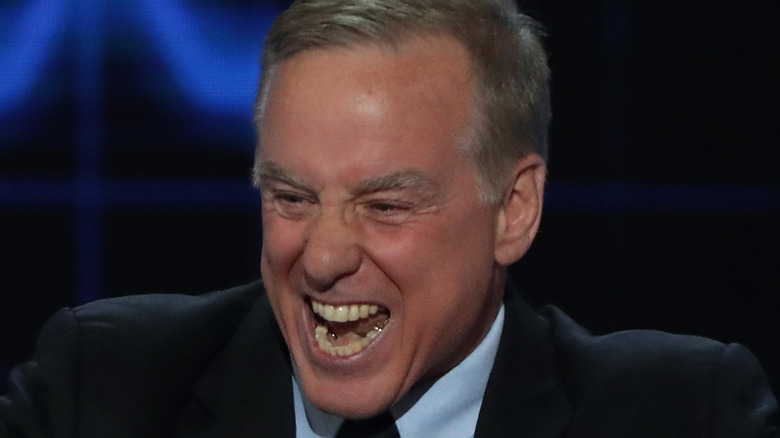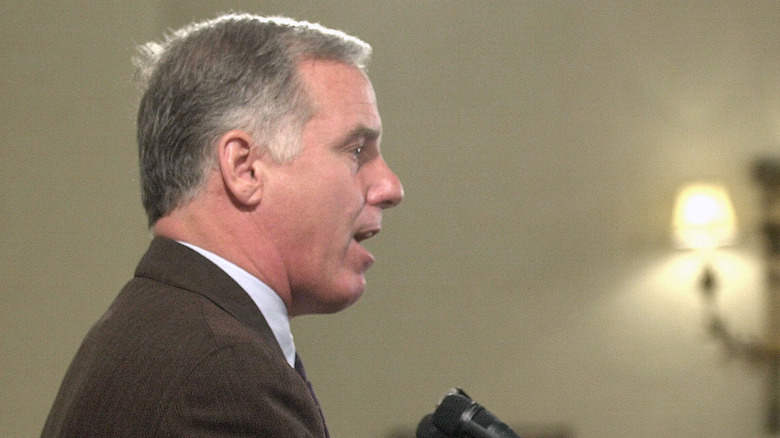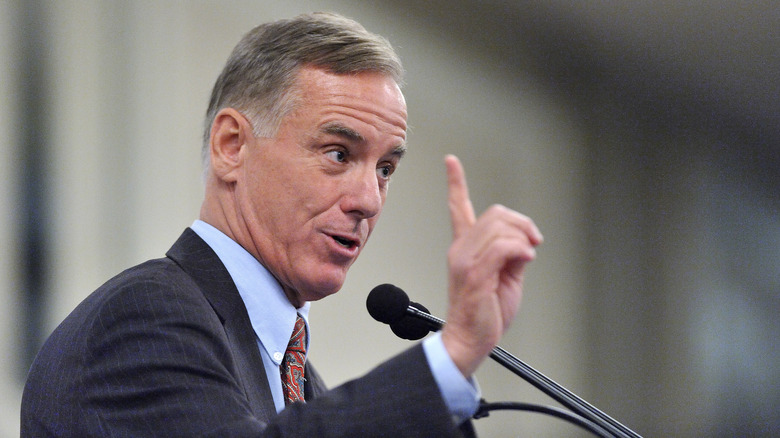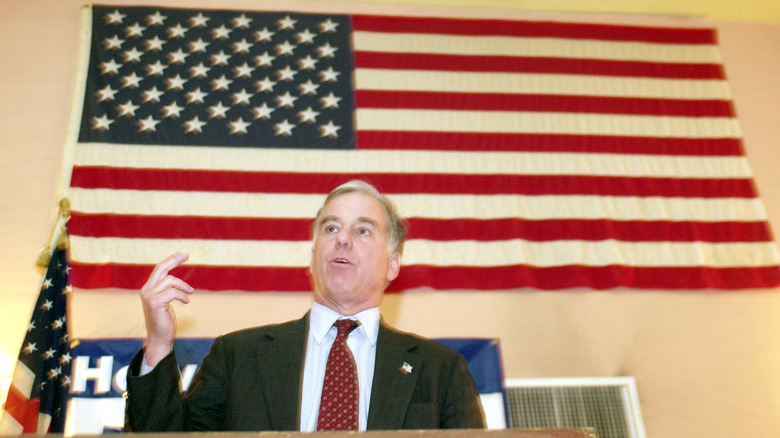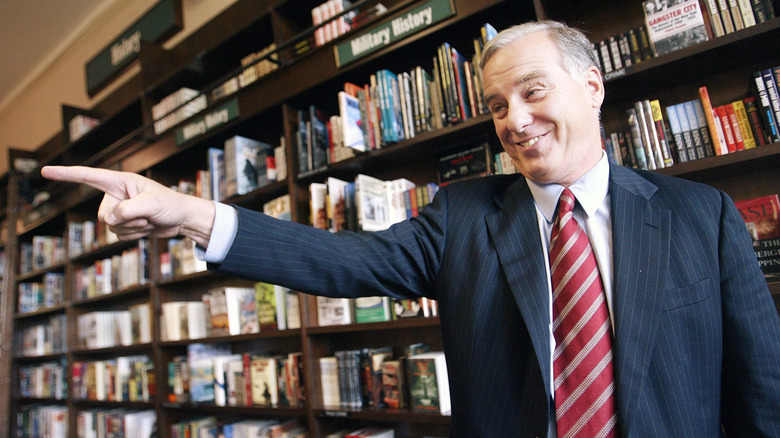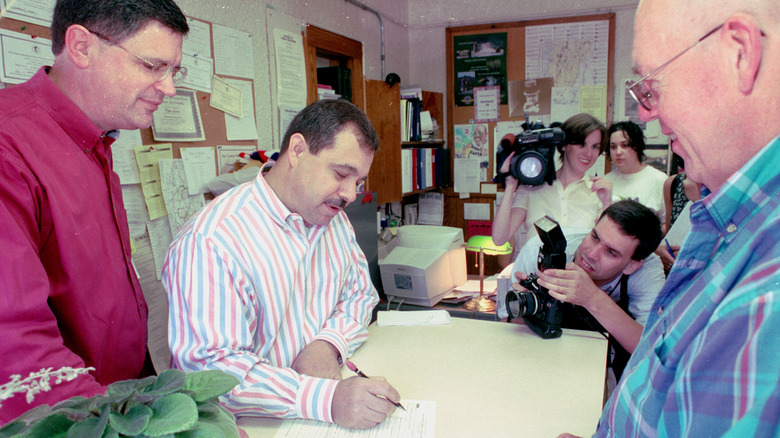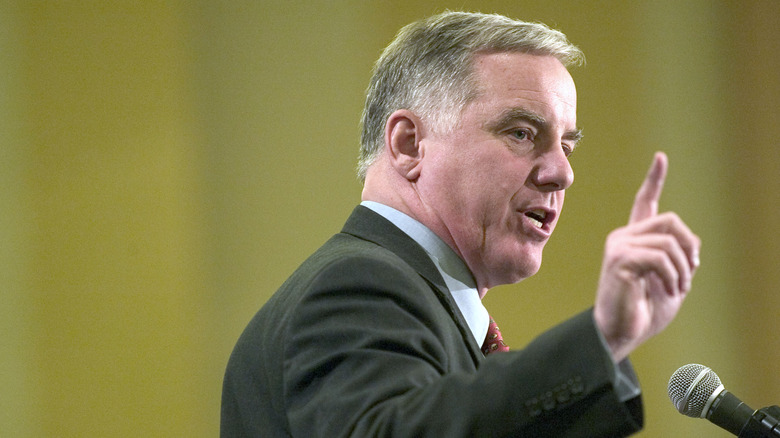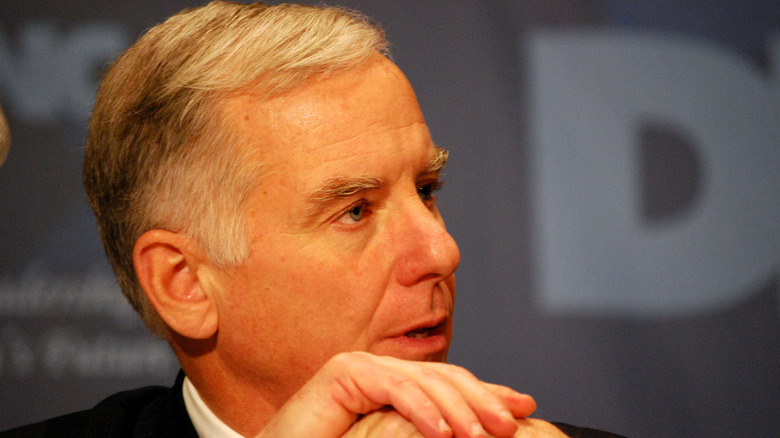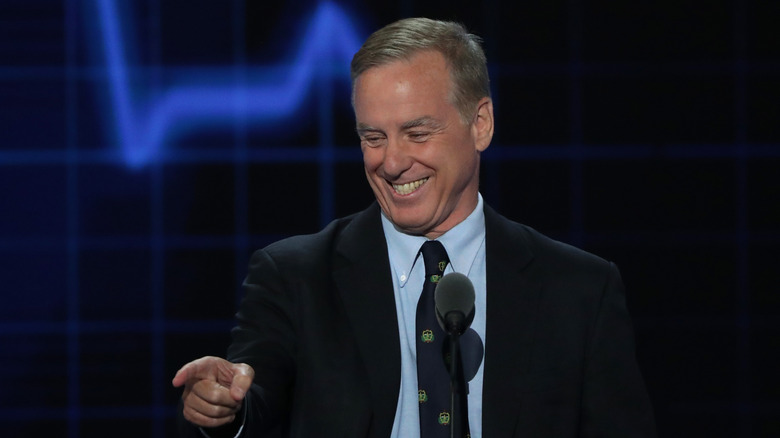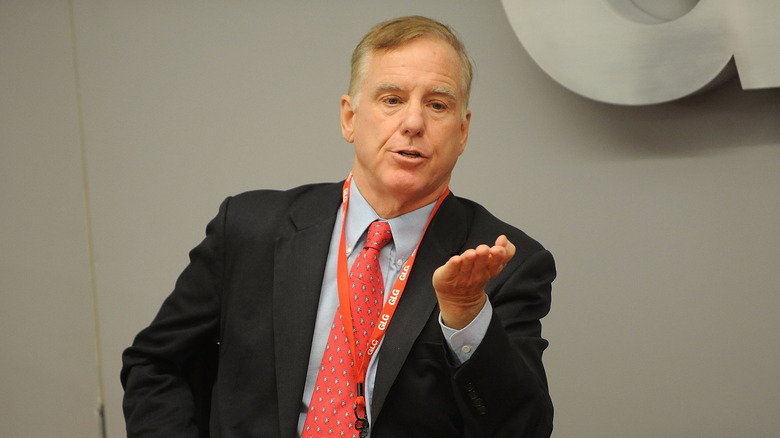What Happened To Howard Dean?
If you were to ask most people if they know who Howard Dean is, they'd probably say, "Is that the guy who screamed?" However, not only was the "Dean Scream" wildly overblown by the media, but there's so much more to the man who went viral during the 2004 presidential election than the weird sound he made for a second.
For many, it seemed like if Dean hadn't screamed, he'd have stood a chance of becoming president. But in fact, Dean was never really a frontrunner for president. And although the scream definitely didn't help, it revealed more about the American media than it did about any of the presidential candidates.
Before deciding to run for president, Dean spent time as a doctor, a state legislator, and governor. And after his failed presidential run, Dean remained in the political sphere for several years before deciding to return to work in the private sector. But in the private sphere, Dean stayed true to his establishment roots, supporting Hillary Clinton in the 2016 presidential election despite the fact that his PAC supported Bernie Sanders.
Dean was repeatedly hailed as a progressive due to his positions on health care and for signing Vermont's civil unions into law. But at the end of the day, he's a "neoliberal" who "consistently carried out Clinton-style, fiscally conservative policies" and rarely shows himself to actually be aligned with progressive principles. This is the story of what happened to Howard Dean.
Howard Dean's early life
Howard Brush Dean III was born in New York City on November 17, 1948. Dean was the oldest child of Andree and Howard Brush Dean Jr. and had three younger brothers. Dean's father worked on Wall Street, as had his own father and grandfather, as a stockbroker. According to CNN, one of Dean's brothers, Charles, was killed along with Australian Neil Sharman in Laos in September 1974, after the two of them were detained under suspicion of espionage.
TIME Magazine writes that the Deans lived primarily in East Hampton, where they belonged to the "superexclusive Maidstone golf club, which for decades had no minority or Jewish members." And while they spent lots of time outdoors, eventually their parents felt that the children should get out of the city, so they sent them to the St. George's boarding school in Middletown, Rhode Island. Apparently, as of 2004, the boarding school cost $30,000 per year and had "its own 69-ft. sloop for student boating."
Dean graduated from Yale University with a B.A. in 1971. Briefly, he opted to go with "the path of least resistance" and decided to become a stockbroker like his father. But Wall Street didn't captivate him, so Dean decided to secretly enroll in pre-med classes at Columbia University. He then went on to study medicine at the Albert Einstein College of Medicine, completing his M.D. in 1978. There, he also met Judith Steinberg, and they married in 1981.
Howard Dean's medical practice
Howard Dean practiced internal medicine in Shelburne, Vermont, after doing his residency at the Medical Center Hospital of Vermont. But according to TIME Magazine, Vermont wasn't Dean's first choice. In fact, Dean "had applied to residency programs at highly competitive hospitals in New York and Washington but was rejected by all of them."
The Encyclopedia of World Biography writes that after completing his residency, Dean and Judith Steinberg started a family internal medicine practice. But while Steinberg believed that after studying medicine for seven years, this would be it for their career, Dean seemed to drift in a different direction. Dean himself has admitted that he "had no idea of getting into politics." However, according to The New York Times, Dean considered his medical training an asset when it came to politics, believing that it got him to "ask tough questions about the facts and to analyze them rationally before deciding on a course of action."
Dean's first step into political life was through small community service when he became involved with a citizens group that was advocating for a bike path around Lake Champlain in 1978. Two years later, he volunteered for President Jimmy Carter's ultimately unsuccessful reelection campaign. However, according to Steinberg, "this was really just a neighborhood thing." It wasn't until Dean got into the state legislature that things "got a little more serious." But even then, Dean continued to work as a doctor.
Assuming the governorship
In 1982, Howard Dean won a seat in Vermont's House of Representatives. He would remain part of Vermont's House of Representatives until 1986 and was elected assistant minority leader in 1985, according to CNN. In 1986, Dean ran to be lieutenant governor of Vermont and won as a Democrat with 53% of the vote. He also won re-election in 1988 and 1990. Throughout this entire time, Dean continued to practice medicine part-time.
According to The American Prospect, everything changed on August 14, 1991, when Dean received a phone call while examining a patient, informing him that Governor Richard A. Snelling had died of a heart attack. As a result, Dean "inherited what he once called 'the greatest job in Vermont.'"
Dean went on to serve as Vermont's governor for 11 years, repeatedly being re-elected by wide margins. During his tenure as governor, Dean often focused on fiscally conservative decisions, and in 2004, The Guardian described him as "a mix of small 'c' conservatism and DIY liberalism." According to Governing, this often led to pushback from Vermont Democrats, especially when Dean refused to extend a temporary income tax increase, "insisting instead that the state would have to deal with its difficulties through budget cuts."
Even though Democrats repeatedly claimed that Dean was "dragging the party too far to the left," as governor, he repeatedly enacted "policies that benefited big corporations at the expense of workers and the environment."
Health care in Vermont
As a medical professional by training, Howard Dean also decided to focus on improving the state's health care system during his time as governor. And at the time, one of the biggest issues facing the health care system was simply the fact that many people in Vermont just didn't have health care. According to The Washington Post, Dean was the first governor in the United States to introduce the idea of "guarantee[ing] health coverage to every state resident." Unfortunately, Dean pulled the bill in May 1994, and the ambitious plan was deemed "an utter failure."
But Dean didn't give up and instead focused on "smaller, incremental changes aimed at filling the state's health care gaps." These changes included expanding coverage for pregnant people, elderly people, and children and creating a health insurance program for low-income people. Dean also expanded Dr. Dynasaur, which provides coverage to pregnant people and children who can't afford private insurance and don't qualify for Medicaid. According to The New Republic, "Vermont is also one of the few states with true community rating, which means insurers can't charge sick people higher premiums."
In 2003, Dean also made universal health coverage a key part of his platform, drawing largely on the ideas he had in 1994, according to CNN. However, by 2016, Dean had seemingly given up on his support on single-payer health care.
The first civil unions
In December 1999, Vermont's Supreme Court determined that the state's marriage law was discriminatory if marriage was only being allowed to straight couples. According to NPR, the legislature was told to remedy the situation by either "extending full marriage rights and benefits to all or by creating a parallel status that would essentially do the same." In the end, the Vermont Legislature went with the more conservative choice of allowing civil unions, and although Howard Dean supported the passage of a civil union bill, according to Slate, he did so because he was ultimately uncomfortable with the idea of gay marriage.
In 2011, Dean admitted his "casual homophobia" during the legislature's civil unions debate and claimed, "I was uncomfortable with gay people and with gay marriage." And he'd already claimed that any bill labeled "marriage" would be vetoed, which is why on April 27, 2000, Vermont became the first state to allow civil unions, "intended to be the parallel of marriage." However, as Counterpunch writes, "Civil unions do not carry with them any of the 1,049 federal rights and benefits of marriage."
After Vermont, ten other states extended civil unions to gay couples. In 2009, Vermont became the fourth state to legalize gay marriage. As a result, civil unions became no longer available, although those registered prior to September 1, 2009, were honored.
Campaigning for president
Howard Dean served as Vermont's governor until January 2003 after deciding not to seek re-election in 2002. Instead, he set his sights on the presidency and, according to Politicize, spent "two years canvassing the country [and] founding a political action committee." On June 23, 2003, Dean declared his intention to run for the Democratic nomination for president. Even before declaring his campaign for presidency, Dean asserted that "President Bush had never made [a] convincing case for war in Iraq as necessary for defending American territory, citizens, allies, or essential interests," and he maintained his position throughout his campaign.
CBS reports that during his campaign, Dean was able to raise up to $40 million and was even featured on the covers of Newsweek and TIME Magazine, "an honor usually reserved for the winner of the New Hampshire primary." Dean was also one of the first people to realize how influential the internet could be for organizing and raising money when it came to politics.
TIME Magazine writes that despite "passionate and widespread support" for the Dean campaign, the campaign organization failed to turn grassroots energy into political fuel. And even though Dean had been endorsed by Al Gore, Bill Bradley, and Tom Harkin, he still ended up finishing third in the Iowa Caucus after John Kerry and John Edwards.
After receiving the Iowa Caucus results, Dean made his infamous concession speech that many claimed doomed his campaign.
The Dean Scream
On January 19, 2004, Howard Dean gave a rousing speech to his supporters in order to motivate them despite his loss in Iowa. U.S. News writes that after listing several states "like a cheerleader at a high school pep rally" and excitedly crying out how they're going to take each state, Dean finished off by saying, "And then we're going to Washington, D.C. — to take back the White House — YEEEEEAAARGH!"
The scream was quickly dubbed the "Dean Scream" and the "I Have a Scream" speech, since it occurred on Martin Luther King Jr. Day, and was even described as "primal" (via U.S. News). And although Dean had already done poorly in Iowa, managing to only get 18% of the vote, many believe that the scream ended up hurting him in New Hampshire, where he placed second. However, "most analysts say it was still the fact of the loss — which the Scream only called attention to — that derailed him."
And this wasn't due so much to the scream itself as much as how the scream was replayed. Because Dean's "microphone filtered out the sound of the audience," he sounds like a man simply screaming. But according to FiveThirtyEight, in the raw audio of the hall, there's so much cheering that Dean's scream can barely be heard through the audience. As a result, the scream audio that was played to the public over and over again on the media ended up being "an absolute misrepresentation of the sound that he made."
The role of the media
The media quickly became obsessed with Howard Dean's scream. Esquire writes that in the first four days after the Iowa Caucus, a clip of the scream was shown on network and cable television stations 633 times. After a week, it had been shown over 900 times. According to the Associated Press (via Esquire), "The number of times it aired on local stations has never been determined, but must surely be in the thousands." At one point, CNN even had it on a loop.
Late-night comedians also latched onto the scream, and it became a target for Jay Leno, David Letterman, and Conan O'Brien. Roll Call writes that the scream was also used by the Democratic establishment, who considered Dean an outsider, to claim that he "did not have the right stuff to be president." Tricia Enright, Dean's communications director at the time, claimed, "It was never going to be about policy. The narrative was temperament."
Meanwhile, Dean said that the constant repetition of the clip on the news showed cable "at its worst." In 2005, the Lawrence Journal World described the media response to the Dean Scream as "the clearest instance of media assassination in recent U.S. political history." Those who worked in media were likely aware of "how tight visual framing and noise-suppression hardware can distort reality," but they decided to focus on a seconds-long sound rather than actually discussing any of the issues that were being debated during the 2004 presidential campaign.
Chairman of the DNC
Despite the failure of his own presidential campaign, Howard Dean remained close to the political sphere and the world of the Democrats. From 2005 to 2009, Dean served as chairman of the Democratic National Committee. However, as The New York Times reports, his term as chairman was "marked by frequent quarrels with Democratic leaders over his abilities and the direction he was taking the party."
During his time as chairman, Dean sought to rework the Democrats' strategy when it came to winning elections. Rather than focusing on battleground states, "Dean pressed the party to expand its efforts and set up offices in all 50 states, arguing that the party was making a mistake in effectively ceding states to the Republican Party."
NBC News writes that in 2008, as party chairman, Dean worked with the Obama campaign. However, he was frequently criticized for not raising enough money and not "doing enough to resolve the Obama-Hillary Clinton nomination fight," writes CNBC.
And as Real Clear Politics notes, despite the criticisms from Democrats and being written off by Republicans, Dean's 50-state strategy ended up being exactly what the Obama campaign needed to propel them to victory in the 2008 presidential campaign.
Going into the private sector
In 2009, Dean announced that he was ending his political career and going into work in the private sector. According to NBC News, Dean wanted a position in President Barack Obama's administration, but when he wasn't picked for any administration job, he decided to go in another direction.
According to The Intercept, in some ways, Dean went in the completely opposite direction. Despite having criticized health care lobbyists during his 2004 campaign, in 2016, Dean was working for Dentons, "a law firm retained to lobby on behalf of a number of pharmaceutical and for-profit health care interests." While Dean isn't a registered lobbyist, as he's pointed out, The Intercept notes that this distinction is "largely meaningless."
When going into the private sector, Dean stated that he planned on making money by "delivering speeches and [sharing] ideas about campaigns and technology with center-left political parties around the world" (via NBC News). Occasionally, he also shows up on MSNBC news network shows.
In 2011, The Wall Street Journal reported that Dean was receiving speaking fees from Mujahedin e-Khalq, an exiled Iranian group that seeks to overthrow the Iranian government: "Around that time, Dean began vociferously arguing on behalf of the MEK, even though he conceded that he had known little about the group before joining its cause," according to The Intercept.
During the 2020 presidential campaign, Dean emerged to give the candidates words of advice: "[W]hoever is going to lose this race better get in line if they care about the country."
